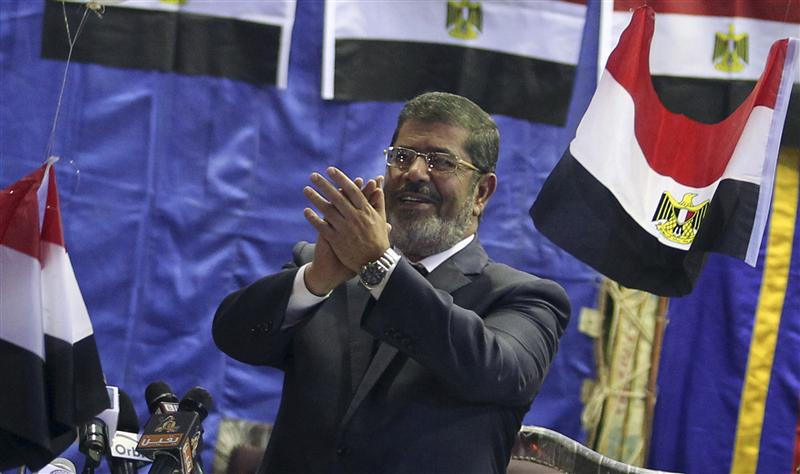Mursi leaves opposition meeting, says presidential council 'unconstitutional'

A revolutionary figure has said that the Muslim Brotherhood's presidential finalist, Mohamed Mursi, voiced objections to the idea of forming an interim presidential council that would assume power and see the ongoing presidential elections cancelled.
Mursi, however, supported pushing for the application of the disfranchisement law that would prevent his rival Ahmed Shafiq from competing in the final stage of the presidential vote.
The young man, who spoke to Ahram Online on condition of anonymity, was among political figures who are attending a meeting held by eliminated presidential candidates Hamdeen Sabbahi, Abdel-Moneim Abul-Fotouh and Khaled Ali to discuss Saturday's verdict in the trial of former president Hosni Mubarak and his associates, as well as the upcoming presidential election runoff vote.
Mursi said a presidential council would not be constitutional, while the rest of the attendees endorsed the idea during the long meeting that was still ongoing at the time of publication.
Mursi, the chairman of the Freedom and Justice Party (FJP), the political arm of the Brotherhood, left after the trio's closed meeting with Sabbahi and Abul-Fotouh, while the other figures are still in talks.
Meanwhile, the official Facebook page of Abul-Fotouh said that he, Mursi and Sabbahi had agreed that there was a need to hold fair and urgent trials for Mubarak and the figures of his regime in order to obtain justice and respect the rights of the martyrs and the injured [from last year’s uprising], and also to hold culpable those responsible for financial and political corruption throughout his [Mubarak’s] tenure.
They also agreed to continue applying pressure until the disenfranchisement law is implemented in an effective way before the runoff vote of the [presidential] elections.
The same page also reported the meeting’s attendees agreed on calling for Tuesday’s million-man march, which has been organised by many political forces, including the April 6 Youth Movement, the Revolution Youth Coalition and the Revolutionary Socialists.
Moreover, the same figures should converge again to further discuss the same topic, including the formation of a civil presidential council, to which the ruling junta would relinquish power.
On Saturday, Mubarak and his interior minister Habib El-Adly were handed life sentences for their role in the killing of peaceful protesters during last year’s uprising. Six of the latter's assistants were acquitted of similar charges.
In a separate corruption case, meanwhile, Mubarak, his two sons Alaa and Gamal, and Egyptian business tycoon Hussein Salem were all found not guilty.
After the verdict, tens of thousands of protesters returned to Cairo's Tahrir Square and public squares throughout the country to question the integrity of Judge Ahmed Refaat who presided over what was described as the 'trial of the century.' Protesters also denounced Mubarak's former prime minister Ahmed Shafiq, who won the second largest share of the popular vote in the first round of the elections in May and will compete with Mursi in the runoffs on 16-17 June.
Shafiq, who held many high-profile governmental positions during the Mubarak era, is seen as a counter-revolutionary force by many revolutionaries.









facebook comments